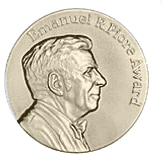|
|
2011 IEEE Emanuel R. Piore Award
|

|
The IEEE Emanual R. Piore Award is presented annually to an individual, or team
of two individuals for outstanding contributions in the field of information
processing, in relation to computer science.
The Emanual R. Priore Award was established by the IEEE Board of Directors
in 1976 and is sponsored by the IEEE Emanuel R. Piore Award Fund.
Recipient selection is administered by the Technical Field Awards Council of
the IEEE Awards Board. In the evaluation process, the following criteria are
considered: contribution, significance, advancement, fundamental innovation,
societal value, and the quality of the nomination.
The award consists of a bronze medal, certificate and honorarium.
The 2011 Emmanual R. Piore Award winner is SHAFI GOLDWASSER
for pioneering work in laying the foundations of modern cryptography and its
relation to complexity theory.
|
Shafi Goldwasser.
Shafi Goldwasser is one of the key figures responsible for the success of
modern cryptography in providing secure electronic data transmission and
exchange. In 1983, her work on probabilistic encryption with Silvio Micali
demonstrated how to use randomness to define and achieve semantic security.
She produced one of the most celebrated results in modern cryptography in 1985
with her work on zero-knowledge proofs with Silvio Micali and Charles Rackoff.
This special type of interactive proof allows one to prove possession of
information or property without revealing the information itself. In the
area of complexity theory, Dr. Goldwasser and co-authors showed a new method
to classify the complexity of even approximating the solution of NP-complete
problems. Dr. Goldwasser with Oded Goldreich and Dana Ron initiated the field
of property testing of combinatorial objects such as graphs.
An IEEE Member, Dr. Goldwasser is the RSA Professor of Electrical Engineering
and Computer Science at the Massachusetts Institute of Technology, Cambridge, MA
and Professor of Computer Science and Applied Mathematics
at the Weizmann Institute of Science, Rehovot, Israel.
|
|
 photo.jpg)
|
Award Presentation
The award presentation will take place on October 23, 2011 at the 2011 IEEE
Symposium on Foundations of Computer Science (FOCS 2011) in Palm Springs, CA,
followed by an award lecture by Dr. Goldwasser.
Past Piore Award Recipients
- 1977: George Stibitz
- 1978: J. Presper Eckert and John Mauchly
- 1979: Richard Hamming
- 1980: Lawrence Rabiner and Ronald W. Schafer
- 1981: No Award
- 1982: Ken Thompson and Dennis Ritchie
- 1983: Niklaus Wirth
- 1984: Harvey G. Cragon
- 1985: Azriel Rosenfeld
- 1986: David C. Evans and Ivan Sutherland
- 1987: David Kuck
- 1988: Grace Hopper
- 1989: Peter A. Franaszek
- 1990: Allen Newell
- 1991: Joseph F. Traub
- 1992: Harold S. Stone
- 1993: Makoto Nagao
|
|
1994: John L. Hennessy
1995: Yale N. Patt
1996: Edward J. McCluskey
1997: Shun'ichi Amari
1998: Janak H. Patel
1999: Narendra Ahuja
2000: William Kahan
2001: Ravishanker K. Iyer
2002: Brian Randell
2003: Giovanni De Micheli
2004: Leslie Lamport
2005: Jacob A. Abraham
2006: Robert K. Brayton
2007: Randal Bryant
2008: Richard Rashid
2009: David J. DeWitt
2010: Nancy A. Lynch
|
2011 Emmanuel R. Piore Award Committee
- Randal E. Bryant, Chair
- Randy Katz, Past Chair
- Jacob Abraham
- David J. DeWitt
- Leslie Lamport
- Nancy A. Lynch
- Joseph Sifakis
Recognition of Professional Achievement
For nearly a century, the IEEE Awards program has paid tribute to technical professionals whose exceptional achievements and outstanding contributions have made a lasting impact on technology, society and the engineering profession.
That tradition of public recognition continues today. In the 21st century, IEEE Awards are valued as among
the highest honors a technical professional can receive. They are an esteemed symbol of the admiration of
one's peers -- the most prized form of prestige --
bestowed upon individuals whose accomplishments have enhanced the global economy while improving the quality of daily life.
Legacy of Innovation
IEEE Awards recognize and encourage important contributions to technology, science and the profession. They honor achievements in education, industry, research and service, and they encompass the breadth of the many IEEE technical interest areas from computer science, electrical engineering, information technologies and microelectronics, to optoelectronics, radar technologies, signal processing and beyond. Each award has its own unique mission and criteria, and offers the opportunity to honor distinguished colleagues, inspiring teachers and corporate leaders.
Through the Awards program, the IEEE, and the societies that preceded it, also have played an important role in encouraging innovation. Individuals honored with IEEE Awards join a remarkable group of such well-known pioneers as Bell, Edison, Marconi, Noyce and Grove among many others. These individuals, in turn, provide inspiration and personal role models for aspiring professionals.


 photo.jpg)